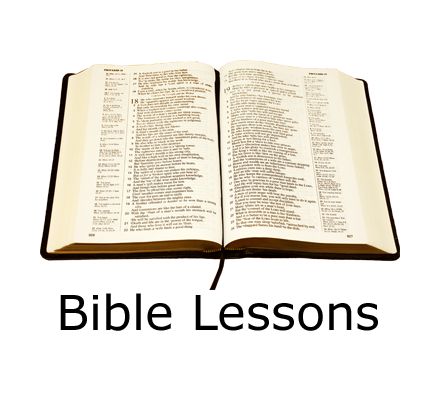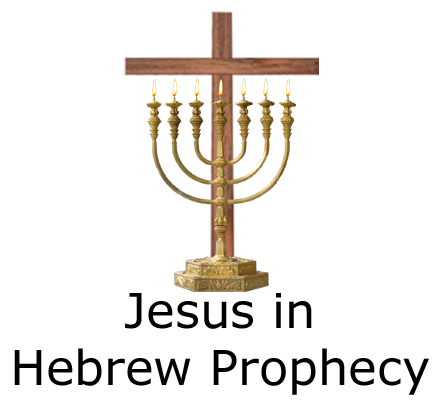-
Dr. McKellar’s Lesson for December 10, 2017
“The Horn of Salvation” Luke 1:67-79 Bible Study 12/10/17
As the horn of salvation, Jesus is the ultimate demonstration of God’s mercy. Therefore, He must be the ultimate treasure of our lives.
I. Consider it Done
-note the use of the past tense
-a visitation and a redemptionII. Highlight the Horn
-a reference to Jesus and not to John
-not a musical instrument but an animal weapon
-sign of strength and means of victoryIII. Magnify God’s Mercy in Jesus
-not a song about saving ourselves
-remedy for a deadly disease and a roaring enemy
-blessing the Lord for His tender mercy
-Psalm 18:2 in its ultimate application -
Dr. McKellar’s Lesson for December 3, 2017
“Thoughts of Hell at Christmas-Time” Hebrews 2:14-15 Bible Study 12/03/17
Our text this morning may seem to be a rather unusual one in light of an approaching Christmas season. However, it answers a fundamental question: Why did God take on human flesh and blood in the Person of Jesus Christ? The answer is that Jesus Christ was born to die-in order that we might be delivered from soul-enslaving fear. Because Jesus Christ was born to die for your sins, you can be delivered from soul-enslaving fear and set free to live with loving abandon.
Five Important Observations from 2:14-15
1. Humans share in a common flesh and blood existence.
-context of 2:10-18
-a basic truth essential to the flow of the text2. Identify the children in verse 14 as the spiritual offspring of Jesus Christ.
-connection to Psa. 22:22 and Isa. 8:18 in verse 13
3. Verse 14 indicates that Jesus took hold of a form previously foreign to Him.
-clothing deity with humanity
-affirmation of incarnation (John 1:14)4. View Christ’s death as the disarming of the devil and his chief weapon.
-purpose clause: …that through death…
-destroy: render powerless
-“Even the devil is God’s devil.” (Luther)5. The disarming of the devil delivers the believer from enslavement to the fear of death.
-fear that frequently takes the form of denial (1 Cor. 15:32)
-“time” after death: the “ages of the ages” (Rev. 14:11)Three Important Applications from Hebrews 2:14-15
1. Face the fear through faith in Christ.
2. Tremble with joy over your rescue.
3. Your ultimate safety should have an immediate impact.
* “God in flesh is the end of fear.” (Meyer)
-
Dr. McKellar’s Lesson for November 26, 2017
For Who He IsJohn 1:14-18Ultimately, Christmas is not about our gifts to each other or even our gifts to the Lord. It is a celebration of God’s immeasurable gift of His Son to us. This morning we will turn to the prologue of John’s gospel to identify some particular truths about Jesus. These truths are important because they indicate the clear distinction between the Christ revealed in Scripture and the Christ other religions claim to honor. As you anticipate Christmas, let the truths of this text encourage you to see Jesus for who He really is. When you understand who Jesus really is, you value Him above everyone and everything.I. See Him as the Word• Before He became flesh, John called Him the Word.
• for communication with the Father
• divine communication to us
• God expressing HimselfII. See Him as the Word existing eternally• with God
• was God
• second person of the TrinityIII. See Him as the agent of creation• underscores that He is God
• indicts the world’s guilty blindness
• origin and explanationIV. See Him as the Life and the Light• the life you need because you are dead
• the light you need because you are blindV. See Him as the exclusive Savior and King• incarnation: word…flesh…dwelt
• “The Almighty appeared on earth as a helpless human baby, needing to be fed and changed and taught to talk like any other child. The more you think about it, the more staggering it gets. Nothing in fiction is so fantastic as this truth of the Incarnation” (Packer)
• glory of the only begotten…
• full of grace and truth
• Jesus Christ: leading outVI. So What?• “…we will never face life alone, now that God has made Himself known, Father and Friend, with us to the end, Immanuel.” (S.C. Chapman)
• Repudiate the reduction of Jesus to a product of history since John plainly asserts that history is the product of His sovereign action.
• “In Jesus Christ we discover an admirable conjunction of diverse excellencies.” (J. Edwards)
• “Our God, heaven cannot hold Him, nor earth sustain; heaven and earth shall flee away when He comes to reign.” (C. Rosetti)
• “We the sons of men rejoice, the Prince of Peace proclaim, with heaven’s host lift up our voice, and shout Immanuel’s name.” (C. Wesley) -
Dr. McKellar’s Lesson for November 19, 2017
“A Psalm for Thanksgiving 2017” Psalm 147:1-11 Bible Study 11/19/17
As we anticipate Thanksgiving next week, we turn our attention this morning to Psalm 147. It is one of a group of Psalms which conclude the Psalter. These Psalms commonly are referred to as “Hallel” Psalms because all of them begin with a form of the word “Hallelujah” (Praise Yahweh). In terms of content, Psalm 147 is a potent rebuke of self-absorbed, narcissistic, man-centered worship. It includes not only calls to praise but causes for praise. This Psalm does not include any reference to the first person pronoun (I). Instead, it refers to God at least 14 times and the Lord 8 times. Psalm 147 is divided into three distinct sections (1-6, 7-11, and 12-20. This morning our focus will be on the first two sections.
I. Praise for Restoration (1-6)
-call to praise-hallelujah: good, pleasant, fitting
-building and gathering: return from exile/completion of wall (Neh. 12:27)
-healing and binding: immanence of God/hearts
-determines and gives: transcendence of God/stars
-abundant power and infinite understanding
-exaltation and debasementII. Praise for Provision (7-11)
-call to praise: sing with thanksgiving
-precipitation and provision-even for ravens!
-the Provider’s delight and pleasure
-fearing the Provider and hoping in HimIII. So What?
-This Thanksgiving, let your fear of the Lord and your hope in Him prime the pump of praise in your life.
-The God of the galaxies is the Physician of hearts. “Star Counting and Heart Healing.” (Ainsworth)
-“Don’t you ever wonder why in spite of all that’s wrong here, there’s still so much that goes right and beauty abounds? ‘Cause sometimes when you walk outside the air is full of song here. The thunder rolls and the baby sighs, and the rain comes down. And when you see the spring has come and it warms you like a mother’s kiss, don’t you want to thank someone? Don’t you want to thank someone for this?”
(A. Peterson)
-“It’s easy passing milestones when you’re going home.” (Thomas Champness)
-“Be not afraid of saying too much in the praises of God; all the danger is of saying too little.” (M. Henry)
-“The God who made the firmament, who made the deepest sea, The God who put the stars in place, is the God who cares for me.” (Berg)
-Ultimate restoration and provision: Emmanuel! -
Dr. McKellar’s Lesson for November 12, 2017
“The Divine Seal of Approval” Leviticus 9:1-24 Bible Study 11/12/17
Our text this morning is a record of how divinely prescribed worship was to be carried out so that it could be blessed by the LORD. Having been redeemed out of Egypt, formed into the people of God, instructed regarding the place and practice of worship and provided with a consecrated priesthood, the people proceeded to obey the LORD’S commands with the result that He manifested His presence among them powerfully.
I. Anticipation (1-6)
-instruction of Moses
-obedience of Aaron and the people
-worship as an act of obedience
-motivation: appearance of the glory of the LORDII. Approach (7-21)
-Aaron offers sacrifices for himself
-Aaron offers sacrifices for the people
-significance of the sequence of sacrifices
-following the prescribed ritualIII. Access (22-23a)
-intercessory role of the High Priest
-blessing of the people (Num. 6:24-26)
-bless: endowment, gift, enrichment
-grace and peaceIV. Assurance (23b-24)
-dramatic revelation of divine appearance
-glory: manifestation of the splendor of His presence
-offering consumed by fire
-response of the people: shout and fallV. So What?
-When the glory of the LORD’S presence grips you, you willingly worship according to His prescribed pattern and gratefully experience His blessing.
-“True forgiveness produces holy awe.” (A. Bonar)
-Determine to be overwhelmed by the LORD’S glory and filled with adoration and praise.
-Catch the connection to Christ (2 Cor. 5:21; Heb. 4:14-16, 7:23-28)
-“The LORD bless you and keep you; the LORD make His face to shine upon you and be gracious to you; the LORD lift up his countenance upon you and give you peace.” (Num. 6:24-26) -
Dr. McKellar’s Lesson for November 5, 2017
“Holy Approach” Leviticus 1:1-17 Bible Study 11/05/17
This morning we turn from the study of Exodus to the study of the closely connected content of the book of Leviticus. 1:1-6:7 is essentially a manual for sacrifices with implications for all of Israel. The laws of the sacrifices lay the foundation for the New Testament teaching of the atoning work of Christ. They also provide the reader with insight into this weighty question: How does an impure, sinful, mortal creature find access into the presence of God?
I. Review/Context
-golden calf (Ex. 32) and the necessity of reconciliation
-tabernacle: the word revealed and worship through sacrifice
-the LORD called…saying
-Lev. 1: focus on burnt offeringsII. Entrance Allowed
-basis of acceptance of the worshiper
-no one prohibited from approaching
-requirement for sacrificial victim: blameless/without defectIII. Procedure Specified
-blood and body of a substitute
-identification of worshiper with the sacrificial victim
-sacrifice “surrendered” and wrath of God satisfied
-atoning sacrificeIV. Acceptance Indicated
-sacrifice consumed by fire on altar
-smell/aroma of sacrifice: pleasing to the LORDV. So What?
-Those who approach God on the basis of atoning sacrifice may experience acceptance with Him forever.
-Note the NT connections: Mt. 20:28; Rom. 3:25; Eph. 5:27: 1Pet. 1:19, 2:22
-“Sacrifice is at the heart of all true worship.” (Ross) -
Dr. McKellar’s Lesson for October 29, 2017
“Enough Already!” Exodus 35:30-36:7 Bible Study 10/29/17
This morning we conclude our series of lessons from the book of Exodus. Our text concerns the construction of the tabernacle. The LORD gives specific and detailed instructions and the workers use their diverse talents in conforming to the divine specifications for the structure. Additionally, the people, so richly blessed by the Lord, respond with a display of overwhelming generosity. All of these factors lead to the fitting conclusion of Exodus in Exodus 40:34-38, where the glory of the LORD fills the tabernacle.
I. Assessing the Building
-a clear case of post-calf grace
-a dwelling designed by the LORD
-constructed to communicate
-attention to the LORD’S instruction
-“It is possible to believe that the Bible is the inerrant Word of God—yet neglect it and effectually repudiate it just because we think that it is not great enough for today’s tasks.” (Boice)II. Embracing the Beauty
-Why not just throw a few boards together?
-empowered artistry: Bezalel and Oholiab
-objective standard of excellenceIII. Experiencing the Blessing
-voluntary offering: an “art” form in itself
-Before you render, you receive. (35:1-3)
-time, talent and treasure (35:4-29)
-The people were restrained!IV. Making the Application
-When you are instructed by God’s principles and inspired by His presence, you pursue lavish participation in His work.
-from the portable to the permanent (1 Pet. 2:5; Eph. 2:21; 1 Cor. 6:19)
-Breathtaking “Beauty” has visited us. (John 1:14)
-Your use of His resources should reflect the depth of His rescue.
-divine artistry to the glory of God! -
Dr. McKellar’s Lesson for October 22, 2017
“Don’t Have a Cow!” Exodus 32:1-6 Bible Study 10/22/17
Beginning with Exodus 24:12, we find Moses meeting with the LORD on the mountain in order to receive the tablets of stone which contained the law and the commandments. With Exodus 32, the scene shifts from the mountain to the encamped Israelites in the valley. This shift sets the stage for the account of Israel’s idolatrous rebellion in the making of and worship of a golden calf. In a real sense, the LORD’S covenant people, rather than trusting the LORD, proceeded to “have a cow.” Today, the hideous practice of idolatry remains a threat for God’s people. Our text today offers a solemn warning for us not to “crave” evil things (1 Cor. 10:6-7).
I. Beware of Disobeying the LORD’S Revealed Will
-violation of at least three commandments
-the major issue in Exodus: worship (24:3, 7)
-“God created man in His image and ever since, man has been trying to return the favor.” (Chesterton)
-“The mind is a perpetual idol factory” (Calvin)II. Beware of Doubting the LORD’S Sufficiency
-impatience with the LORD’S timing
-disrespect for the LORD’S representative (Acts 7:39-40)
-a hostile “takeover”III. Beware of Distorting the LORD’S Purpose
-the LORD’S reputation (9:16)
-a self-serving mentality
-a demonstration of depravity
-idolatry leading to immorality
-“What we revere, we resemble, either for our ruin or our restoration.” (Beale)IV. Beware of Discounting the LORD’S Activity
-the misuse of the LORD’S gifts
-a case of spiritual amnesia (Psa. 106:19-22)V. So What?
-Knowing that God abhors idolatry, repudiate it and replace it with holy intoxication.
-battling infidelity with intoxication (Eph. 5:18)
-“As A. W. Pink has written: ‘Man must have an object, and when he turns from the true God, he at once craves a false one.’ But this statement can also be reversed. The way to reduce our craving for false gods is for our minds and hearts to be intoxicated with the Spirit of the one true God.” (Ryken)
-Don’t have a cow! Rather, have the conquering King of the Ages who comes to you in the person of Jesus Christ. -
Dr. McKellar’s Lesson for October 15, 2017
“The Lord’s Dress Code” Exodus 28:31-43 Bible Study 10/15/17
The greatest need of sinful humans is the perfect righteousness of Christ. Long ago, in his detailed description of the priestly wardrobe, the Lord pointed to this essential truth. Far from being an exercise in mere minutiae or a catalog of irrelevant information, the specific instructions regarding priestly garments remind us of the awesome responsibility and privilege of a relationship with the Lord. His wardrobe requirements are not optional but essential. It takes a holy priest to make a holy people.
I. Discern the Details
-the robe
*seamless
* bell and pomegranate-the headgear
*turban
*diadem
*inscription-the underclothes
*waist to thigh
*a striking contrast-the High Priest adorned with holy majesty: magnificent clothes/magnificent ministry
II. Depend on the Right High Priest
-savoring the sense of the sacred
-“Power is God’s hand or arm, omniscience His eye, mercy His bowels, eternity His duration, but holiness is His beauty.” (Charnock)
-sobering yourself with the stress on the suitable
-refusing to minimize sin
-Zechariah’s vision in Zech. 3:1-5
-“I am convinced that the first step toward attaining a higher standard of holiness is to realize more fully the amazing sinfulness of sin.” (Ryle)
-relying on the accepted priest (Heb. 7:23-28; 12:14)
-reflect on John 19:23III. So What?
-Because God is holy and you are not, your greatest need is to claim the “wardrobe” of holiness that only He can provide.
-“Upon a life I did not live, upon a death I did not die; another’s life, another’s death, I stake my whole eternity.” (Bonar)
-“When He shall come with trumpet sound, Oh, may I then in Him be found; dressed in His righteousness alone, Faultless to stand before the throne. On Christ, the solid Rock, I stand; All other ground is sinking sand, All other ground is sinking sand.” (Mote)





















